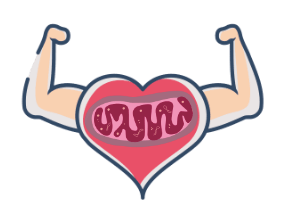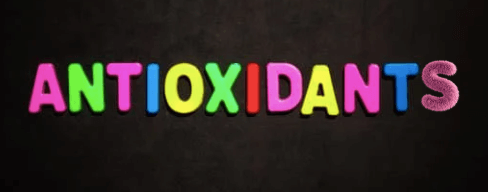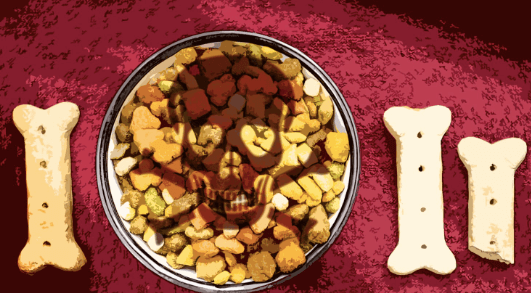Heathy mitochondria keep us healthy. When I was in 7th grade biology, I learned that the mitochondria is "the powerhouse of the cell." I literally never thought much about mitochondria and overall health. It wasn't until I got Sheldon, my bulldog, 10 years ago who has recently crossed over the rainbow bridge, was sick that I began to think about how body systems work and why what you do and what you put into your body is important.
Mitochondria are membrane-bound parts of the cell that create most of the chemical energy required to power the biochemical reactions within the cell. Specifically, mitochondria are responsible for growth from infancy, helping to cleanse the liver, metabolism of cholesterol and neurotransmitters and keeping the hormones estrogen and testosterone in balance. Biochemically, mitochondria are responsible for converting food and water into energy the body can use (Authentic Pets). When mitochondria are damaged, sickness occurs. Healthy mitochondria create overall health. Healthy mitochondria keep us healthy.
My bulldog was from champion bloodlines and chronically ill for most of his puppyhood. He had every routine vaccination and even received vaccinations when he was sick, because I honestly thought I was saving myself a trip to the vet and saving money by thinking I was taking care of the sickness and vaccinations at the same time. I thought wrong. I know now that he was chronically ill because his mitochondria weren't functioning properly. His mitochondria weren't functioning properly because I fed him kibble, vaccinated him way too often and gave him so many meds. I believe now that healthy mitochondria keep us healthy.
So what damages mitochondria? "Nutrient deficiencies, environmental toxins and oxidative stress according to an article titled, "Mitochondria - Fundamental to Life and Health" published in the Integrative Medicine: A Clinician's Journal." In humans, studies have shown that damage to mitochondria has been linked to early aging, amyotrophic lateral sclerosis, Alzheimer's disease, autism, cardiovascular disease, chronic fatigue syndrome, dementia, diabetes, Huntington's disease, migraines, and Parkinson's disease. I have no doubt it is exactly the same for dogs.
So what causes damage to our dogs' mitochondria? Kibble, vaccines and prescription drugs are the major culprits.
Kibble is a slow-form of poison. It is highly processed, genetically modified, incredibly starchy round and brown pellets that do not come anywhere near fulfilling a dogs' nutrition optimally. In order to create kibble, one must cook protein, sugars (carbs) and fats at 400 degrees to bind together and make these little pellets. The moment this "bond" happens a Maillard reaction takes place, and creates a carcinogen called Acrylamide. This has been proven to affect mitochondria. Mitochondrial alteration plays a central role in various oxidative stress-related disease. Oxidative stress causes inflammation. Ultimately, kibble causes inflammation by messing with mitochondria and is linked to cancer, allergies, heart disease and every chronic complication out there.
Vaccines also can damage mitochondria. They are important as long as they are administered carefully and conservatively, not just "cuz" your vet or some antiquated guidelines says so. There are many ingredients that are far from natural and could absolutely damage mitochondrial function. In addition to the dead pathogen vaccines contain, adjuvants, preservatives like mercury aka thimerosal, formaldehyde, animal tissue, fungicides, antimicrobials, salts, and contaminants like glyphosate from GMO fed animals used in the proteins (Dogs Naturally Magazine). These are toxins that absolutely can alter biochemical processes and damage mitochondrial health.
Prescription drugs like acetaminophen, antibiotics, aspirin, ibuprofen and metformin also damage mitochondria (Mitochondria - Fundamental to Life and Health) by interfering with important biochemical processes that need to happen in cells to keep a dog (or human or any organism) healthy. Unfortunately, these drugs are often prescribed by most vets. In addition to damaging mitochondria, taking a pill for whatever symptoms, simply masks the symptom and does not actually heal the root cause of sickness in the first place.
If you plan to keep your dog healthy and intend him or her to have a long and happy life, you need to feed a nutrient-dense diet and not kibble. You need to vaccinate carefully. Please click here to learn more about what to feed your dog and here to learn about how and when to vaccinate. These two actions alone will keep you out of the vets office and away from prescription medication that can further damage your dogs' mitochondria. Healthy mitochondria keeps us healthy.
If your dog is sick and you need some guidance on helping them feel better, please visit Bobzilla's Happy, Healthy Life Made Simple.
Donate to Bobzilla.org

$5.00
The veterinary business is business which is not in the business of curing your animal, but Bobzilla's business is. Bobzilla is committed to one hundred percent transparency in all of its scientific research into animal wellness and prevention of disease and one… read more




